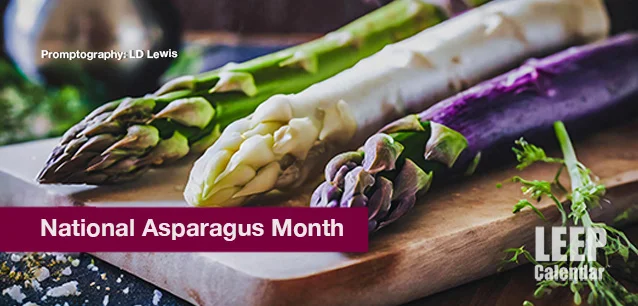 AD
AD
Today is: November 13
Scroll to explore events active on this date.
LEEP INK FEATURES

August is Appropos
A toddler playing in the fountain at a park in Santa Fe, New Mexico—Photo LD Lewis. In August, we live through the Dog Days of Summer. It's hot and often humid, and those ...

September is Sassy
Can you hear that sigh of relief from parents worldwide? Yes! September marks the return of students to school, a global phenomenon. Preparations for the ACT and SATs begin earnestly for ...

OOH LA LA, October
October is the busiest month for events, with 5% more happening than in May, the second most eventful month. Sailing enthusiasts will be glued to the finals of this year's Am...
About National Asparagus Month
Retail , United States
Ends: May 31, 2024
DESCRIPTION:
Asparagus Month, which is celebrated annually in May, is an observance dedicated to appreciating asparagus, a nutritious and versatile vegetable. This month encourages the exploration of asparagus in various culinary forms and highlights its health benefits.
Asparagus, a perennial flowering plant species in the asparagus, is known for its edible young shoots. Rich in vitamins and minerals, it's low in calories and a good source of fiber. Asparagus graces various dishes worldwide, ranging from simple steamed preparations to complex recipes in gourmet cooking. It is valued for its distinct, slightly earthy flavor and can be grilled, boiled, steamed, or roasted.THANK ZIRYAB IF YOU LOVE ASPARAGUS
Asparagus made its way to the royal court meals in Andalusia, Córdoba (Spain), on the Iberian Peninsula, circa 840-852 AD. Abu al-Hasan Ali Ibn Nafi, or as he was more commonly known, Ziryab, meaning "Blackbird" or "Jaybird" in Persian, cooked and served the vegetables. He was the first to do so.
Ziryab was born in 789 AD in what is today Iraq. He is one of the more interesting characters in history, rising from slavery to the top of the royal court during his life. Thanks to him, we have music schools, toothpaste, deodorant, clothes for different seasons, asparagus, and a three-course meal, and those are just his most well-known contributions.TYPES OF ASPARAGUS
Asparagus, known scientifically as Asparagus officinalis, is primarily classified into three main types based on color: green, white, and purple. Each type has unique characteristics and is grown and prepared differently.
Green Asparagus: This is the most common type found in grocery stores. It's known for its vibrant green color and earthy, slightly grassy flavor. Green asparagus gets its color from photosynthesis as it grows above ground in the sun.
White Asparagus: Grown mainly in Europe, white asparagus is cultivated by depriving the plants of sunlight (a process known as etiolation). This lack of the sun prevents the production of chlorophyll, which is what gives green asparagus its color. White asparagus is thicker, more tender than the green variety, and has a milder, more delicate flavor.
Purple Asparagus: This variety has a burgundy to purple color due to the presence of anthocyanins (plant pigments). It is generally sweeter, more tender than green asparagus, and has a fruitier flavor. Purple asparagus turns green when it's cooked.WHERE ASPARAGUS IS GROWN
Asparagus is grown in many parts of the world, with each region having its own preferred variety:
Green Asparagus: Widely grown in the United States (mainly California, Michigan, and Washington), parts of Europe, and other countries with similar climates.
White Asparagus: Popular and primarily grown in parts of Europe, especially Germany, France, Spain, and the Netherlands.
Purple Asparagus: Less common than the other varieties, it is mainly grown in Italy.
Asparagus thrives in temperate climates where the ground freezes in the winter, as the plant needs a period of dormancy. The soil type, climate, and cultivation method all play a role in asparagus's flavor and texture.
Asparagus Month is an unofficial event aligning with the vegetable's peak season. The month is an opportunity to educate people on asparagus' nutritional value and encourage its use in diverse and nutritious recipes.
VIDEOS
SUPPORTING DOCUMENTS
Currently, this event does not have supporting documents.
ADDITIONAL IMAGES
Currently, this event does not have supporting images.
Where would you like to go now?
 AD
AD


/footer-logo.svg)
